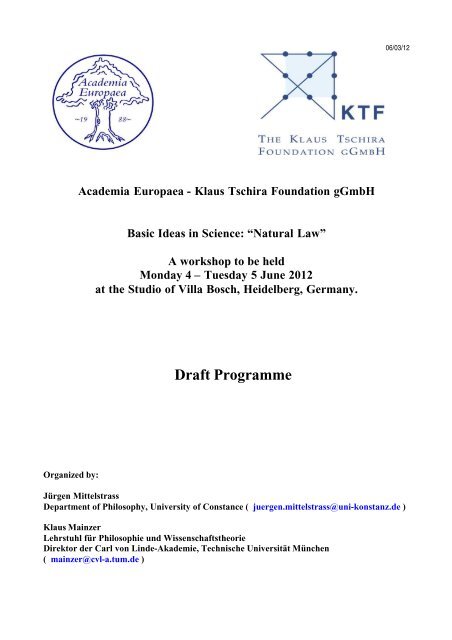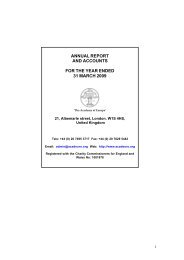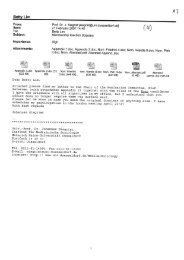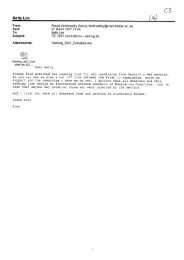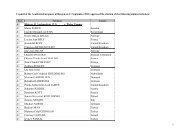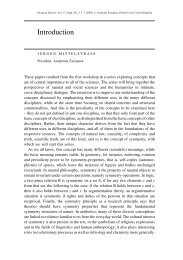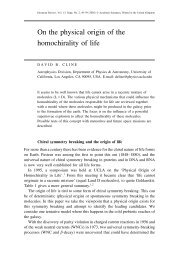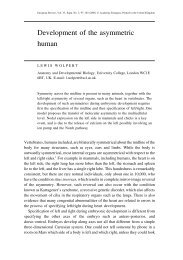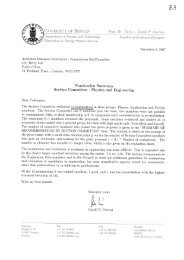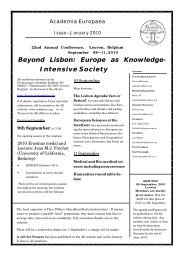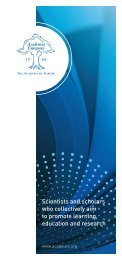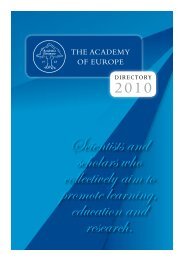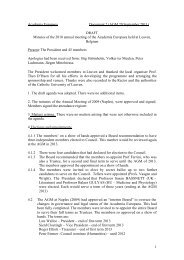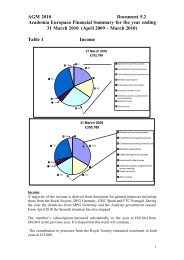Draft Programme - Academia Europaea
Draft Programme - Academia Europaea
Draft Programme - Academia Europaea
Create successful ePaper yourself
Turn your PDF publications into a flip-book with our unique Google optimized e-Paper software.
06/03/12<strong>Academia</strong> <strong>Europaea</strong> - Klaus Tschira Foundation gGmbHBasic Ideas in Science: “Natural Law”A workshop to be heldMonday 4 – Tuesday 5 June 2012at the Studio of Villa Bosch, Heidelberg, Germany.<strong>Draft</strong> <strong>Programme</strong>Organized by:Jürgen MittelstrassDepartment of Philosophy, University of Constance ( juergen.mittelstrass@uni-konstanz.de )Klaus MainzerLehrstuhl für Philosophie und WissenschaftstheorieDirektor der Carl von Linde-Akademie, Technische Universität München( mainzer@cvl-a.tum.de )
Monday 4 June15.30 Bus leaves *Crowne Plaza Hotel for Villa Bosch Studio16.15-16.30 Opening Remarks: Jürgen MittelstrassSession 1 - IntroductionChair: Jürgen Mittelstrass (Konstanz)Speaker:Klaus Mainzer (Technische Universität München)16.30-17.00 The Concept of Law in Natural, Technical, and Social Systems17.00-17.30 Discussion17.45-19.00 Buffet receptionSession 2 - Concept of Law in PhysicsChair: Klaus Mainzer (Technische Universität München)Speakers:19.00-19.30 Claus Kiefer (University of Cologne)The Concept of Law in Physics19.30-19.45 Discussion19.45-20.15 M. Dorato (University of Rome)The Concept of Law in the Philosophy of Physics20.15-20.30 Discussion20.30-21.00 General discussion21.00 Bus returns to the *Crowne Plaza HotelTuesday 5 June09.00 Bus leaves *Crowne Plaza Hotel for Villa Bosch Studio09.15-09.45 Mathias Frisch (University of Maryland)Causality and Natural Laws in Physics09.45-10.00 Discussion10.00-10.30 Coffee BreakSession 3 - Concept of Law in ChemistryChair: (to be announced)Speakers:10.30-11.00 Martin Quack (ETH Zurich)The Concept of Law in Chemistry11.00-11.15 Discussion
11.15-11.45 Joachim Schummer (Technische Universität Karlsruhe)The Concept of Law in the Philosophy of Chemistry11.45-12.00 Discussion12.00-13.00 LunchSession 4 - Concept of Law in BiologyChair: Peter MacLaughlin (Heidelberg)Speakers:13.00-13.45 Gerard Jagers op Akkerhuis (Vrije Universiteit Amsterdam)The Concept of Law in Systems Biology13.45-14.00 Discussion14.00-14.30 Anne Fagot-Largeault (Université Paris) (to be confirmed)Natural Law in the Philosophy of Biology14.30-14.45 Discussion14.45-15.15 General Discussion15.15-15.45 Coffee BreakSession 5 - Concept of Law RevisitedChair: Jürgen Mittelstrass (Konstanz)Speakers:15.45-16.15 Christian Strack (Universität Göttingen)The Concept of Law from a Legal Point of View16.15-16.30 Discussion16.30-17.00 Dagfinn Føllesdal (University of Oslo)The Concept of Law from a Philosophical Point of ViewSession 6 - Final discussionChair: Jürgen Mittelstrass17.00-17.30 Panel discussion17.45 Bus returns to the Crowne Plaza Hotel20.00 Dinner at Weisser Bock(24, Grosse Mantelgasse, 69117 Heidelberg)__________________________________________________________________________________*Please note:the bus departs from and returns tothe rear door of the Crowne Plaza Hotel and NOT the main front door.
RationaleThe Concept of Law in ScienceIn the past, the Academy of Europe (<strong>Academia</strong> <strong>Europaea</strong>) has organized a series of interdisciplinaryconferences on basic concepts in science. These concepts are more or less fundamental in several scienceswith high importance in classical and contemporary philosophy. In the past, we considered the concepts ofsymmetry, complexity, and causality. Many recommended experts from several disciplines took part. Theconference papers were published in “Physical Review”, the official journal of <strong>Academia</strong> <strong>Europaea</strong>.In June 4-5, another conference of this series will be organized at the Klaus Tschira Foundation inHeidelberg. The conference topic is dedicated to the concept of law in science. In classical tradition, naturallaws were considered as eternal truths of the world. Galileo and Newton even proclaimed them as “thoughtsof God” represented by mathematical equations. In Kantian tradition, they became categories of humanmind. David Hume criticized their ontological status and demanded their reduction to habituations ofsentiments and statistical correlations of observations. In main stream 20 th century science, laws were oftenunderstood as convenient instruments only or even deconstructed in Feyerabend’s “anything goes”. But, theNewtonian paradigm of mathematical laws and models seem also to be extended to the life sciences (e.g.,systems biology). Parallel to the development in natural sciences, a change of public meaning of laws insociety can be observed over the last centuries. In economics, experimental, statistical, and behavioralapproaches are favored. In any case, the ontological basis of laws, sometimes blamed as “Platonism”, seemsto be lost. In the beginning of the 21 st century, the question arises: Are laws still important concepts ofscience? What is their contemporary meaning and task in different disciplines? Are there already alternativeconcepts or do laws remain an essential concept of science?06/03/12


